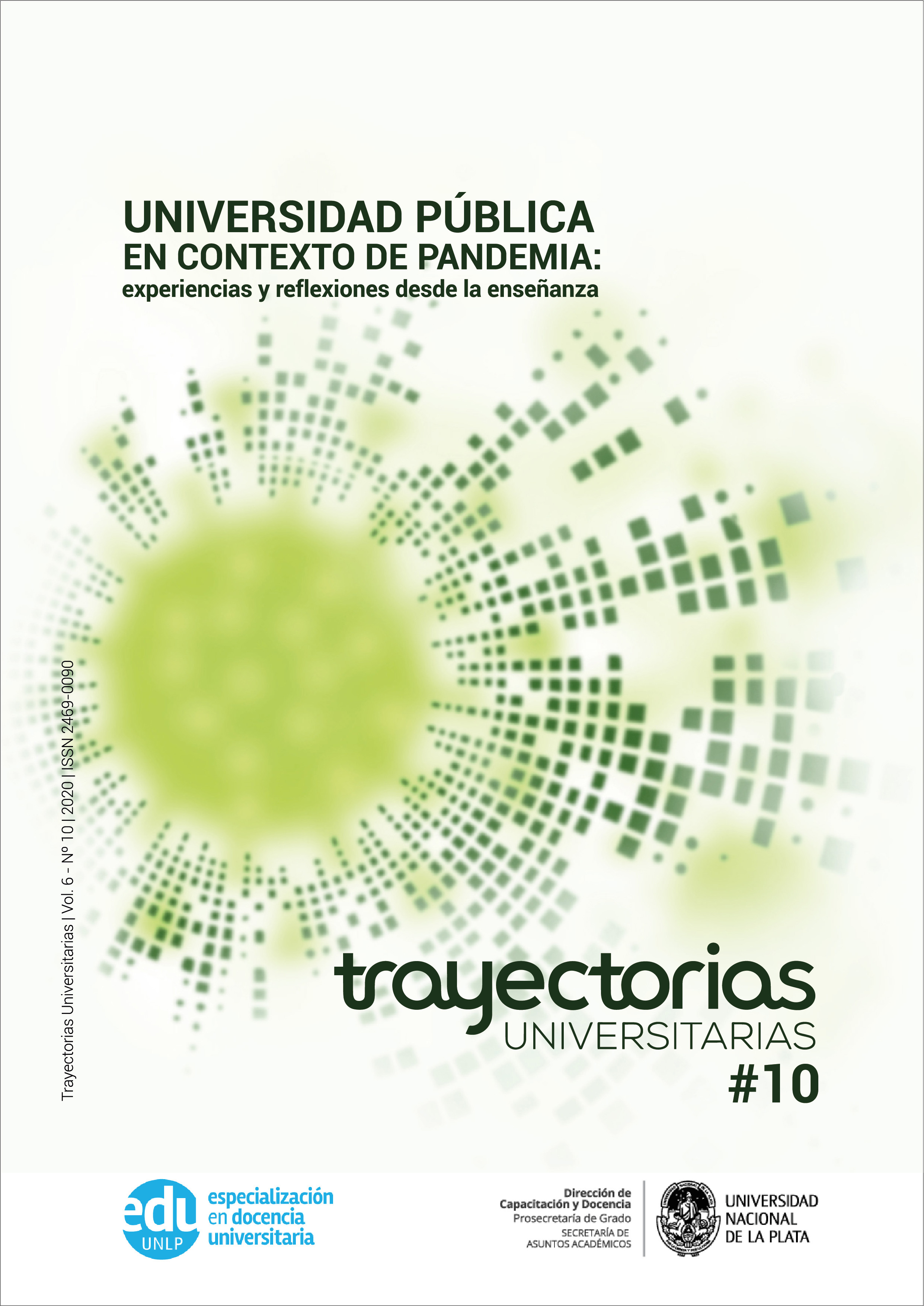An experience of education in health emergency: from face-to-face to the virtual environment
DOI:
https://doi.org/10.24215/24690090e023Keywords:
environment - virtual - students - emergencyAbstract
Through the development of the following experience as teachers, we seek to make a description and make visible aspects for analysis on the modification and complexity of the teaching-learning processes in the context of health emergency by Covid-19, which currently crosses Argentina and others countries of the world.
Faced with this complex moment, compulsory social distancing calls into question the teaching-learning strategies as they have been proposed since the creation of formal education, where students attend a physical space (the educational establishment ) to be able to acquire and build knowledge. Thus, since the current year, the regulations imposed by the emergency have implied that teachers adapt the curricular spaces in which we work to new technologies, having to rethink not only the strategies to be implemented, but also the difficulty of access of some subjects to virtual spaces.
In this sense, the current socio-economic conditions show that not all students have access to services or technology that allows a sustained process in virtual education time.
At the same time, we identified the need for educational institutions to implement greater institutional resources in order to deal with this complexity, promoting greater accompaniment to the diversity of situations that students have.
It is through this narration of our experience that we develop the transformation process, from a face-to-face structure to a virtual one, encompassing different media and platforms, and also thinking about future strategies, aimed at promoting permanence and academic advancement.
KEY WORDS: environment - virtual - students - emergency.
Downloads
Metrics
References
Goldar, María Rosa y equipo de cátedra (2019). “Programa de Trabajo Social III: Abordaje Comunitario y Grupal - Desarrollo Local”. Lic. en Trabajo Social, Facultad de Ciencias Políticas y Sociales. Mendoza, UNCuyo
Goldar, María Rosa y equipo de cátedra (2020). “Programa de Trabajo Social III: Abordaje Comunitario y Grupal - Desarrollo Local”. Lic. en Trabajo Social, Facultad de Ciencias Políticas y Sociales. Mendoza, UNCuyo
Osorio Gómez, Luz (2011). “Ambientes híbridos de aprendizaje”. Actualidades Pedagógicas, N° 58. Julio-diciembre 2011, 29-44.
Secretaría Académica (2020). “Protocolo para Mesas de exámenes finales en contexto de aislamiento social, preventivo y obligatorio”. Facultad de Ciencias Políticas y Sociales. Mendoza, UNCuyo. Disponible en: http://fcp.uncuyo.edu.ar/upload/protocolo-2020-propuesta-4-de-mayo.pdf
Downloads
Published
How to Cite
Issue
Section
License
La aceptación de un original por parte de la revista implica la cesión no exclusiva de los derechos patrimoniales de los/as autores/as en favor del editor, quien permite la reutilización, luego de su edición (postprint), bajo una Licencia Creative Commons Atribución-NoComercial-CompartirIgual 4.0 Internacional (CC BY-NC-SA 4.0).
Acorde a estos términos, el material se puede compartir (copiar y redistribuir en cualquier medio o formato) y adaptar (remezclar, transformar y crear a partir del material otra obra), siempre que a) se cite la autoría y la fuente original de su publicación (revista y URL de la obra), b) no se use para fines comerciales y c) se mantengan los mismos términos de la licencia.
La cesión de derechos no exclusivos implica que luego de su edición (postprint) en Trayectorias Universitarias los/as autores/as pueden publicar su trabajo en cualquier idioma, medio y formato; en tales casos, se solicita que se consigne que el material fue publicado originalmente en esta revista.
Tal cesión supone, también, la autorización de los/as autores/as para que el trabajo sea cosechado por SEDICI, el repositorio institucional de la Universidad Nacional de La Plata, y sea difundido en las bases de datos que el equipo editorial considere adecuadas para incrementar la visibilidad de la publicación y de sus autores/as.
Asimismo, la revista incentiva a los/as autores/as para que luego de su publicación en Trayectorias Universitarias depositen sus producciones en otros repositorios institucionales y temáticos, bajo el principio de que ofrecer a la sociedad la producción científica y académica sin restricciones contribuye a un mayor intercambio del conocimiento global.





















